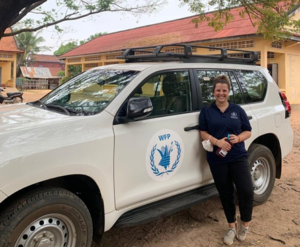Above: A local market in Mondulkiri Province, Cambodia. 📸: Bailey Adams
There is a tendency amongst medical professionals, nutritionists, and development practitioners to believe human behavior is rational and grounded in logic. We think that if people are given the right information, they will make the right decisions for their health. In reality, human behavior is often complex, irrational, and governed by external conditions that make it difficult to act on that information and make healthy decisions.
I work in nutrition. While I don’t claim to be an expert, I probably know more about nutrition and healthy diets than the general population. Yet that does nothing to stop my late-night ice cream cravings or my excessive consumption of Reese’s peanut butter cups. It also doesn’t prevent me from eating spaghetti multiple nights a week after I come home exhausted from a long day of work. Simply possessing knowledge about nutrition is not enough to impact my behavior.
So why do we think that simply teaching people the components of a healthy diet will automatically lead to better nutrition outcomes, when that same approach doesn’t work for those of us working in the nutrition space?
Yet, this has been the approach to improving nutrition for years.
However, this has begun to change with the increased use of social and behavior change (SBC) approaches. SBC goes beyond sporadic information, education, and communication activities to focus on a set of strategic, evidence-based activities, approaches, and tools designed to change behavior.
The basis for SBC comes from the understanding that individual behavior is profoundly influenced by a complex set of sociocultural norms and influences that extend beyond individual knowledge and attitudes. As such, SBC takes an integrated approach to support individuals and communities to adopt the recommended behaviors while also working to remove the structural barriers to practicing those behaviors.
Though the causes of malnutrition are incredibly complex, nearly all the immediate and underlying causes are behavioral (e.g., dietary intake, care, and feeding practices, health-seeking behavior, sanitation, and hygiene practices). As such, SBC is an increasingly important tool used to improve nutrition outcomes and promote the consumption of healthy diets around the world. Indeed, at the UN World Food Programme (WFP) – where I am currently serving as a Leland Fellow – SBC is gaining notable prominence across our portfolio of nutrition work.
While this is an important and positive trend, SBC is often thought of in a very technocratic way when what we seek to do requires fundamental alterations in cultures, norms, and patterns of being. Beyond the relatively surface-level investigation of current knowledge, attitudes, and practices used to design “locally appropriate” and “evidence-based” SBC approaches, there is a need to investigate linkages between history and culture and examine intersectional identities and realities through an ethnographic or anthropological lens.

Bailey Adams (above), Leland Fellow with WFP Cambodia
As part of my work with WFP in Cambodia, I currently serve as the primary investigator for two formative research studies meant to inform the development of a nutrition and gender SBC campaign. This campaign will be integrated into a new project focused on nutrition, livelihoods, and resilience that WFP will be implementing in the remote, eastern part of the country.
In the first study, I am trying to redefine the basic parameters for formative research and incorporate some of the more sociocultural and anthropological components. This includes undertaking a participatory qualitative study designed to assess women’s empowerment and inclusion in the agricultural sector; examine differences in roles and norms for women and men, indigenous and Khmer people, and people of different ages; uncover the relevance of social norms and power relations in this specific context; and identify the differing needs, constraints, and opportunities for sub-populations and the impact of these differences in their lives. The study tools are designed to put the research subjects in the driver’s seat, to better uncover the complexities of their lived realities and experiences.
On the other hand, the second study will be a more traditional quantitative survey assessing nutrition knowledge, attitudes, and practices. This approach poses a more complex challenge – but also an opportunity – to creatively leverage additional activities and desk research to generate complementary findings that account for the more complex linkages between history, religion, culture, and identity. For instance, through deep dives into secondary literature, I hope to better understand how colonialism, decades of civil war, in-migration, livelihood transitions, and access to natural resources has shaped the dietary habits of indigenous populations.
Ultimately, this approach aims to ground the SBC strategy more firmly in the unique sociocultural context so that it is more effective. It is also an important opportunity to inform how WFP conducts formative research for SBC, as this becomes an increasingly central component of WFP’s nutrition work.

